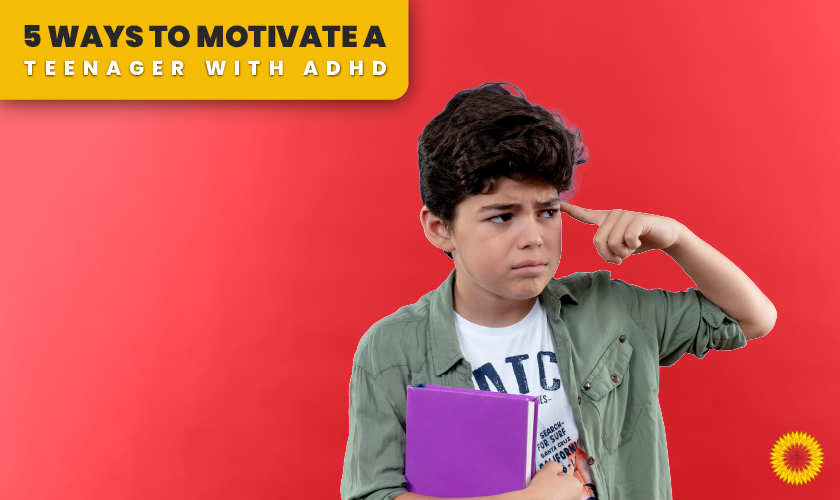Parents and caregivers of teens with ADHD are familiar with their challenges.
ADHD affects teens’ ability to concentrate, follow instructions, and control their impulses.
With the right strategies and support, you really can help motivate your teenager with ADHD to perform well academically and personally.
Teen brains, whether with or without ADHD, face motivational challenges.
According to the American Academy of Childhood and Adolescent Psychiatry, even teenagers without ADHD struggle to maintain motivation for tasks and goals.
Teens with ADHD show specific processing differences:
- The amygdala controls the brain, which makes them more emotional and reactive.
- Their frontal cortex less influences them, so they must be aware of the long-term effects.
Below, we’ll discuss five strategies to motivate a teenager with ADHD.
Five Ways to Motivate a Teenager With ADHD
1. Be respectful.
Maintain a respectful approach while dealing with your teen’s ADHD—progress doesn’t always follow a straight path.
Progress can be ups and downs.
- Recognize that ADHD is a neurological difference. Teens with ADHD need specific skills to manage this condition properly.
- Offer your help but also encourage independence.
- Acknowledge and celebrate your teen’s abilities alongside addressing the ADHD challenges.
2. Set up a routine.
Routines benefit teens with ADHD. A daily schedule helps them know what’s coming, which relieves stress and helps them feel more in control. Keep these things in mind:
- Talk to your teenager about setting clear, attainable behavior goals.
- Break tasks into smaller steps.
- Make a schedule or chart for your teen so they know what to do.
- Give them a dedicated space where they can study or work.
- For a better mood and focus, set a regular bedtime.
An ADHD daily routine checklist makes it easier to help your teen.
3. Use behavior agreements.
Teenagers with ADHD can be motivated through behavior goal agreements
A behavior agreement outlines specific behaviors.
- Decide on the behavior or goal you want your teen to work on, like finishing homework on time.
- List what your teen will get to achieve the goal.
- Be sure the agreement is easy to understand and you agree on it.
4. Give positive and uplifting awards.
It’s easy to motivate teens with ADHD with positive rewards.
Praise and reward when your teen reaches goals or accomplishes specific tasks. What you can do is:
- Give the teen credit for their efforts, even if they are small.
- You can also give them rewards they’ll enjoy, like extra screen time or a nice, fun trip.
- Celebrate their wins and triumphs together with them.
5. Show your support when it comes to your teen’s passions and hobbies.
Be encouraging of your teen’s interests and pursuits.
When teenagers are passionate about something, motivation comes easily.
You can motivate your kid to pursue their hobbies, whatever they might be—sports, art, music, or anything else they find interesting.
They give incentives as well as a means to improve patience and self-discipline.
In Conclusion
Motivating a teenager with ADHD will require strength, kindness, and understanding.
Keep an open mind as you make adjustments.
Find out how neurofeedback therapy can also help teens with ADHD.
You can seek advice and help from professionals experienced in treating ADHD.
Whatever else you do, continue to encourage and love your child unconditionally.
FAQs
Q. What can I do to help my teenager focus better at school?
These are some ways you can help your teen focus in school:
- Set up a routine.
- Give your teen a quiet place to study and do homework.
- Break their tasks down into smaller ones.
You can also talk to professionals about what works best for your teen.
Q. Is there a connection between ADHD and texting?
The frequent notifications, alerts, and just the overall nature of texting can be overwhelming–it’s essential to balance technology use and set rules for its use.
Q. How can I help my teen with ADHD follow instructions better?
Ensure they understand what’s expected of them—use clear, concise language and break down tasks. Behavior contracts can help reinforce following instructions.
Q. Is there a hypersensitivity test for ADHD?
A professional can examine sensory sensitivities in an ADHD assessment, but there is no official test for ADHD hypersensitivity.
Q. Can tapping techniques help teens with ADHD?
Tapping—known as the Emotional Freedom Technique (EFT)-helps manage ADHD.
The process involves tapping on acupressure points while focusing on a goal. It might be worth exploring alongside other strategies.
Q. Is ADHD contagious?
ADHD is not contagious; it is a neurodevelopmental disorder that affects how your brain develops.



No comment